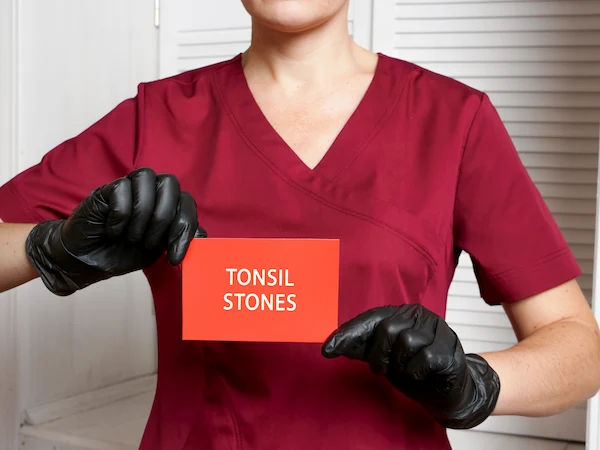Tonsillar Pain: Causes, Symptoms And Treatment Of Tonsillar Pain
Tonsillar pain occurs when the tonsil becomes infected. Know how it happens and its possible treatments.

Written by Dr Sonia Bhatt
Last updated on 3rd Jul, 2025
Tonsillar pain is the discomfort of the tonsil (one of two lymphatic tissues located in the back of the throat). Tonsils usually assist in fighting off infections, but they can become infected or inflamed, resulting in painful symptoms like a sore throat, difficulty swallowing, or even earache. While infection is the primary cause of tonsil pain, other reasons, like trauma and stones, can also cause this pain. So, understanding the reasons behind this condition and its treatment is the first step towards a healthy, pain-free life.
Causes of Tonsillar Pain
There are many reasons for tonsillar pain. The main causes are infectious, both viral and bacterial, and then non-infectious ones. Some examples of viral infections are:
Common Cold
Epstein-Barr Virus (EBV)
Influenza (Flu)
Adenovirus
Bacterial infections are also common causes of tonsillar pain. One of the more familiar is strep throat, due to Group A Streptococcus (GAS). Other bacterial infections that can involve the tonsils are: Staphylococcus aureus and diphtheria.
In terms of non-infectious reasons, the following can lead to tonsillar pain:
Tonsilloliths (Tonsil Stones)
Tonsilloliths, otherwise known as tonsil stones, form when food particles, bacteria, and dead cells get caught in the tonsils. Over time, they can calcify, irritating and causing mild pain in the tonsils.
Peritonsillar Abscess
Peritonsillar abscesses are a type of pus accumulation that typically forms in the wake of a tonsil infection. It is a more severe malaise that can cause excruciating pain, difficulty swallowing, fever and a muffled voice.
Trauma or Injury
Tonsil damage may also occur due to sharp/hard food, accidents, or as a result of physical trauma. This leads to transient injury to the tonsils and causes pain that is typically self-limiting and self-resolving.
Symptoms Associated with Tonsillar Pain
Symptoms accompanying tonsillar pain will differ based on what is causing the pain. Some are common for many reasons, and others may be more particular to certain situations. The general symptoms of tonsillar pain include:
Sore Throat: A persistent pain or scratchiness in the throat that is usually worse when swallowing.
Difficulty Swallowing (Dysphagia): Enlarging the tonsils may make swallowing painful or difficult.
Swollen Tonsils: The tonsils may be swollen, red, or have white spots or streaks.
Tiredness or Fatigue: Many infections, especially viral ones, cause fatigue or general discomfort.
Hoarseness or Voice Changes: Swelling in the throat can lead to a raspy or muffled voice.
Bad Breath (Halitosis): Bacterial infection in the tonsils can result in persistent bad breath.
Diagnosis of Tonsillar Pain
When tonsillar pain is experienced, a healthcare professional will likely perform a physical examination to determine the cause. They will look for redness, swelling or white patches on the tonsils and may check the lymph nodes in the neck. Additional tests may include:
Throat Culture or Rapid Strep Test
If the doctors suspect a bacterial infection, they will perform a throat swab to test for Group A Streptococcus (GAS). A quick strep test can provide results in minutes.
Blood Tests
Blood tests (for example, a complete blood count or CBC) can help determine if the infection is viral or bacterial. If mononucleosis is suspected, the doctor may also take a test for Epstein-Barr Virus (EBV).
Imaging Tests
In the case of a peritonsillar abscess or other serious conditions, imaging tests such as an ultrasound or CT scan may be used to confirm the diagnosis and guide treatment.
Treatment for Tonsillar Pain
The treatment for tonsillar pain depends on the underlying cause. While viral infections often resolve on their own, bacterial infections typically require antibiotics. For more severe cases, such as abscesses or chronic diseases, additional interventions may be needed.
In terms of medications, individuals can rely on the following:
Antibiotics: For bacterial infections, such as strep throat, antibiotics like penicillin or amoxicillin are prescribed to clear the infection.
Pain Relievers: Over-the-counter pain relievers like paracetamol or ibuprofen can help reduce pain and fever.
Antiviral Medications: Although rare, antiviral drugs may be prescribed for certain viral infections, such as mononucleosis.
In most cases of tonsillar pain, home remedies prove to be enough. Here are some suggestions:
Saltwater Gargles: Gargling with warm salt water can soothe a sore throat and reduce inflammation.
Drinking Ample Fluids: Plenty of fluids helps keep the throat moist and reduce discomfort.
Throat Lozenges or Sprays: Throat lozenges or sprays that contain menthol or eucalyptus can numb the throat and ease pain.
Surgical intervention is extremely rare for tonsillar pain and is only required in extreme cases. Here is when surgery becomes imminent:
Tonsillectomy: In chronic or recurrent tonsillitis cases, the tonsils may need to be removed. This procedure is typically considered if other treatments have not worked.
Abscess Drainage: A healthcare provider may need to drain a peritonsillar abscess to relieve pain and prevent further complications.
When to See a Doctor?
Medical attention should be sought if:
Tonsillar pain persists for more than a few days or worsens
Difficulty swallowing or breathing
A high fever (102°F) that does not improve with over-the-counter medication
White patches, swelling, or asymmetry are noticed in the tonsils
Persistent pain or difficulty swallowing
Ear pain and muffled hearing
Stiff Neck
Difficulty Opening the Mouth
Blood in Saliva or Phlegm
Preventing Tonsillar Pain
While preventing all causes of tonsillar pain is impossible, certain precautions can help reduce the risk.
Practice Good Hygiene: Regular handwashing helps reduce the spread of infections. It is also recommended that you avoid sharing drinks or utensils with others.
Strengthen the Immune System: Eating a balanced diet, regular exercise, and ensuring sufficient sleep can help maintain a strong immune system.
Avoid Irritants: Avoiding smoking and exposure to other irritants, such as pollutants or allergens, can reduce the risk of tonsillar irritation.
Potential Complications of Untreated Tonsillar Pain
Neglecting tonsillar pain can have several health implications, some of which may turn severe with time. Here is what you can expect:
Chronic Pain and Discomfort: Continuous torturous pain in the tonsils can affect the daily activities of life, making drinking, speaking or sleeping difficult.
Higher Chance of Serious Infections: Overlooked tonsillar infections, such as tonsillitis, can escalate into dangerous conditions like a peritonsillar abscess, in which pus builds up near the tonsils.
Scarlet Fever: It is a severe infection that damages the organs and creates a pink-red skin rash.
Rheumatic Fever: It is an infection that causes inflammation in the body.
Conclusion
Tonsillar pain is a common issue with many possible causes. Although most viral infections are mild and self-resolving, bacterial infections or conditions like abscesses or tumours need immediate medical care. Recognising the symptoms and seeking prompt treatment can facilitate better tonsillar pain management and help avoid complications. So, individuals seek medical care for an accurate diagnosis and treatment plan and get back to normal life.
Consult Top ENT Specialists
Consult Top ENT Specialists

Dr. Nishant Rana
Ent Specialist
8 Years • MBBS. MS ENT
Delhi
Apollo Hospitals Indraprastha, Delhi

Dr. Vijayalakshmi R
Ent Specialist
11 Years • MBBS, DLO
Bengaluru
Apollo Clinic, Basavanagudi, Bengaluru

Dr. Nitin Mittal
Ent Specialist
8 Years • MBBS, MS (ENT)
Kolkata
HOLISTIC ENT AND DENTAL SUPERSPECIALITY CLINIC, Kolkata

Dr. Ankit Parasher
Ent Specialist
8 Years • MBBS, MD
New Delhi
AAKASH MEDSQUARE, New Delhi

Dr. Suvidha Kaul
Ent Specialist
10 Years • MBBS, DNB (E.N.T) / ( OTORHINOLARYNGOLOGY)
Bengaluru
Apollo Medical Center, Marathahalli, Bengaluru



